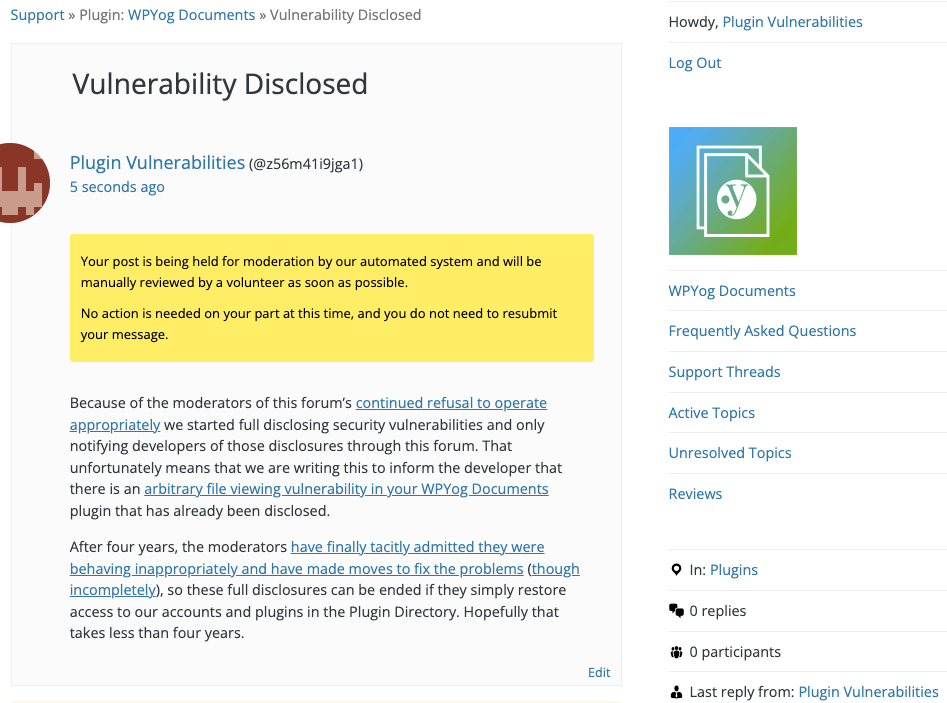Our Proactive Monitoring Caught an Arbitrary File Viewing Vulnerability Being Introduced in to a WordPress Plugin
One way we help to improve the security of WordPress plugins, not just for customers of our service, but for everyone using them, is our proactive monitoring of changes made to plugins in the Plugin Directory to try to catch serious vulnerabilities. Through that, we caught one of those vulnerabilities, an arbitrary file viewing vulnerability being added to the plugin WPYog Documents.
We now are also running all the code in the plugins used by our customers through that monitoring system on a weekly basis to provide additional protection for them.
The possibility of this vulnerability is also flagged by our Plugin Security Checker, so you can check plugins you use to see if they might have similar issues with that tool.
We tested and confirmed that our firewall plugin for WordPress protected against the type of exploitation of this vulnerability you would see in a mass hack, even before we discovered the vulnerability, as part of its protection against zero-day vulnerabilities.
Arbitrary File Viewing
There isn’t much to the vulnerability.
In the plugin’s main file, the function wpyog_document_template_redirect() is registered so that it runs when accessing frontend pages of WordPress:
317 | add_action('template_redirect','wpyog_document_template_redirect'); |
The code in that function will cause the file on the website specified by the POST input download_url to be downloaded:
318 319 320 321 322 323 324 325 326 327 328 329 330 331 332 | function wpyog_document_template_redirect() { if (isset($_REQUEST['download_url']) && !empty($_REQUEST['download_url'])) { $filepath = $_REQUEST['download_url']; header('Content-Description: File Transfer'); header('Content-Type: application/octet-stream'); header('Content-Disposition: attachment; filename="'.basename($filepath).'"'); header('Expires: 0'); header('Cache-Control: must-revalidate'); header('Pragma: public'); header('Content-Length: ' . filesize($filepath)); flush(); // Flush system output buffer readfile($filepath); die(); } } |
It looks like the functionality is intended to be used to allow downloading files in the plugin’s /wp-content/uploads/ directory, but it doesn’t have any restriction on what files can be downloaded.
WordPress Causes Full Disclosure
As a protest of the moderators of the WordPress Support Forum’s continued inappropriate behavior we changed from reasonably disclosing to full disclosing vulnerabilities for plugins in the WordPress Plugin Directory in protest, until WordPress gets that situation cleaned up, so we are releasing this post and then leaving a message about that for the developer through the WordPress Support Forum. (For plugins that are also in the ClassicPress Plugin Directory, we will follow our reasonable disclosure policy.)
You can notify the developer of this issue on the forum as well.
After four years, the moderators have finally tacitly admitted they were behaving inappropriately and have made moves to fix the problems (though incompletely), so these full disclosures can be ended if they simply restore access to our accounts and plugins in the Plugin Directory. Hopefully that takes less than four years.
Update: To clear up the confusion where developers claim we hadn’t tried to notify them through the Support Forum (while at the same time moderators are complaining about us doing just that), here is the message we left for this vulnerability:

Proof of Concept
The following proof of concept will show the contents of the WordPress configuration file.
Make sure to replace “[path to WordPress]” with the location of WordPress.
http://[path to WordPress]/?download_url=wp-config.php